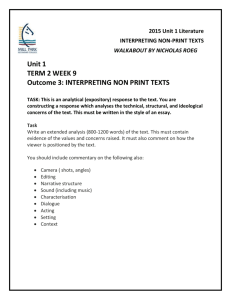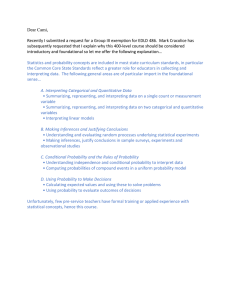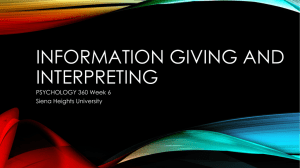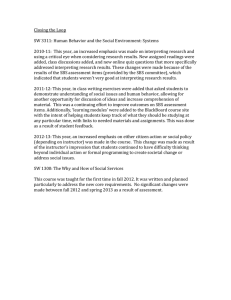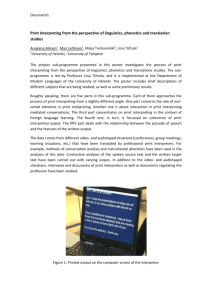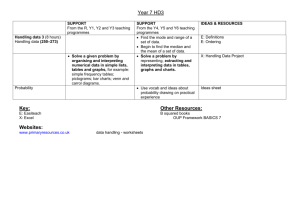of Submission Name:
advertisement
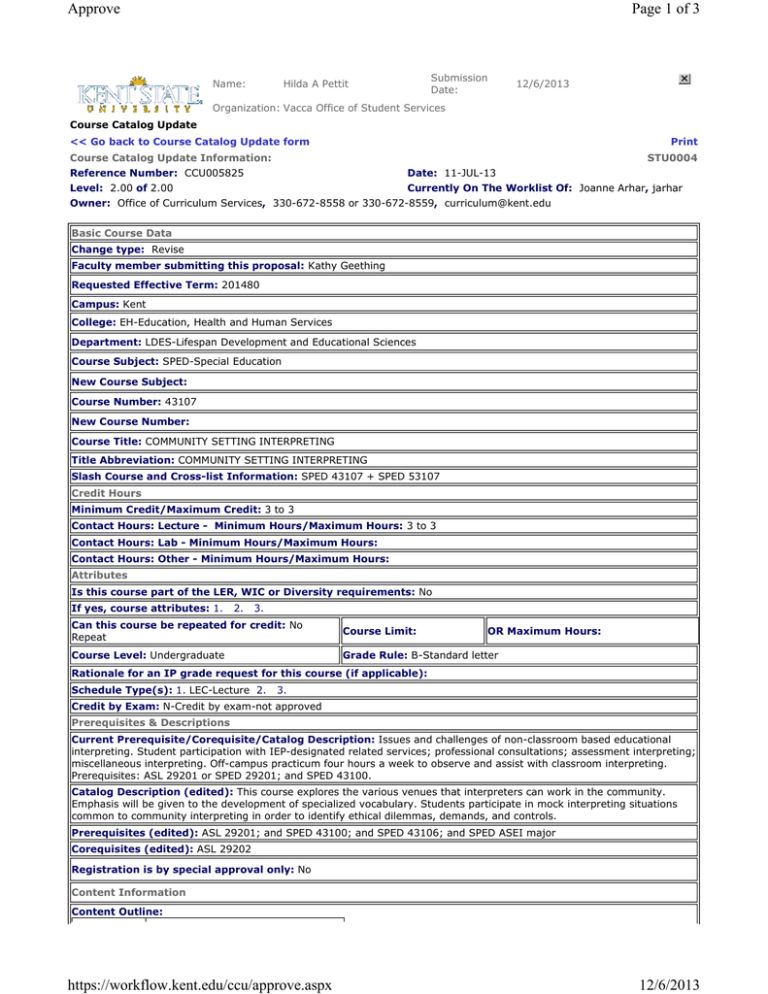
Approve Page 1 of 3 Name: Submission Date: Hilda A Pettit 12/6/2013 Organization: Vacca Office of Student Services Course Catalog Update << Go back to Course Catalog Update form Print Course Catalog Update Information: STU0004 Reference Number: CCU005825 Date: 11-JUL-13 Level: 2.00 of 2.00 Currently On The Worklist Of: Joanne Arhar, jarhar Owner: Office of Curriculum Services, 330-672-8558 or 330-672-8559, curriculum@kent.edu Basic Course Data Change type: Revise Faculty member submitting this proposal: Kathy Geething Requested Effective Term: 201480 Campus: Kent College: EH-Education, Health and Human Services Department: LDES-Lifespan Development and Educational Sciences Course Subject: SPED-Special Education New Course Subject: Course Number: 43107 New Course Number: Course Title: COMMUNITY SETTING INTERPRETING Title Abbreviation: COMMUNITY SETTING INTERPRETING Slash Course and Cross-list Information: SPED 43107 + SPED 53107 Credit Hours Minimum Credit/Maximum Credit: 3 to 3 Contact Hours: Lecture - Minimum Hours/Maximum Hours: 3 to 3 Contact Hours: Lab - Minimum Hours/Maximum Hours: Contact Hours: Other - Minimum Hours/Maximum Hours: Attributes Is this course part of the LER, WIC or Diversity requirements: No If yes, course attributes: 1. 2. 3. Can this course be repeated for credit: No Repeat Course Limit: Course Level: Undergraduate Grade Rule: B-Standard letter OR Maximum Hours: Rationale for an IP grade request for this course (if applicable): Schedule Type(s): 1. LEC-Lecture 2. 3. Credit by Exam: N-Credit by exam-not approved Prerequisites & Descriptions Current Prerequisite/Corequisite/Catalog Description: Issues and challenges of non-classroom based educational interpreting. Student participation with IEP-designated related services; professional consultations; assessment interpreting; miscellaneous interpreting. Off-campus practicum four hours a week to observe and assist with classroom interpreting. Prerequisites: ASL 29201 or SPED 29201; and SPED 43100. Catalog Description (edited): This course explores the various venues that interpreters can work in the community. Emphasis will be given to the development of specialized vocabulary. Students participate in mock interpreting situations common to community interpreting in order to identify ethical dilemmas, demands, and controls. Prerequisites (edited): ASL 29201; and SPED 43100; and SPED 43106; and SPED ASEI major Corequisites (edited): ASL 29202 Registration is by special approval only: No Content Information Content Outline: https://workflow.kent.edu/ccu/approve.aspx 12/6/2013 Approve Content Hours per Course Topic 3 3 3 3 6 3 6 3 3 3 3 3 3 Page 2 of 3 Topic Description Code of Professional Conduct: discuss and apply CPC to community interpreting scenarios Demand Control Schema: identify possible demands of community interpreting; discuss and identify controls available to remedy demands Freelance versus contract work in community interpreting: describe business practices of freelance and contract work Preparation for interpreting assignments: analyze situations to determine the logistics of interpreting i.e. placement, pre-conferencing with the presenter, the use of specialized terminology Medical interpreting: discuss specialized vocabulary; situationspecific logistics of medical interpreting; medical interpreting domains and competencies Mental Health interpreting: discuss specialized vocabulary; situationspecific logistics of mental health interpreting; mental health interpreting domains and competencies Introduction to interpreting process Models: Colonomos and Gish Process Models. Apply techniques of summarizing and paraphrasing discourse to develop interpreting skills Vocational Rehabilitation Interpreting: discuss specialized vocabulary; situation-specific logistics of vocational rehabilitation interpreting Social Services Interpreting: discuss specialized vocabulary; situationspecific logistics of social service interpreting Legal Interpreting: discuss specialized vocabulary; situation-specific logistics of legal interpreting Video Relay Interpreting: discuss specialized vocabulary; situationspecific logistics of video relay interpreting Visualization skills: aid in comprehension to determine meaning versus form when interpreting; aid in memory to increase processing time Display/Hide Delimited Course Outline Total Contact Hours: 45 Textbook(s) used in this course: Patrie, C., ASL Skills development. San Diego, CA: Dawn Sign Press. Research Articles. Writing Expectations: Interpreting scenario analysis, Interpreting observation analysis, self assessment. Additional for grad students: two interpreting scenario analyses including identifying demands, controls, and ethical dilemmas. Instructor(s) expected to teach: SPED Staff Instructor(s) contributing to content: Pam Luft Proposal Summary Explain the purpose for this proposal: https://workflow.kent.edu/ccu/approve.aspx 12/6/2013 Approve Page 3 of 3 information, and writing expectations in order to keep the course current with practices in the field. The title is changed from Nonclassroom Interpreting to Community Setting Interpreting. Interpreters work in a variety of settings, one of which being community interpreting. This course is the lone course within the ASL interpreting program that introduces the setting specific vocabulary and logistics of various community interpreting venues. By completion of the course students will be able to identify and integrate into their analysis papers and interpreting samples: 1. Setting specific specialized vocabulary used in community interpreting settings (medical, mental health, vocational rehabilitation, video relay, social services, legal); 2. possible demands and controls in a variety of settings; 3. Code of Professional Conduct; 4. Gish Process Model of Interpreting ; 5. Colonomos Process Model of Interpreting; 6. visualization strategies that identify comprehension of various discourse samples. Explain how this proposal affects program requirements and students in your unit: No effect. Explain how this proposal affects courses, program requirements and student in other units: No effect. Explain how this proposal affects enrollment and staffing: No effect. Units consulted (other departments, programs or campuses affected by the proposal): None Revisions made to form (if applicable): Course Content Number Credit by Exam Prerequisites Credit Hours Schedule Type Cross-Listed / Slash Subject Description Title Diversity Title Abbreviation Grade Rule Writing-Intensive (WIC) Liberal Education Requirement (LER) Other Comments (500 Character Maximum): NOTE: Please do not use the following restricted characters: (~ * / \ --) Approve Comments: Date User 12/5/2013 Susan M Augustine Return To Initiator Return To Prior Approver Deny Comment Other Revisions: writing expectations, textbook and instructor information. History: Date User Status 12/5/2013 Susan M Augustine Approved 7/29/2013 Stacey M Dickman Submitted https://workflow.kent.edu/ccu/approve.aspx 12/6/2013
